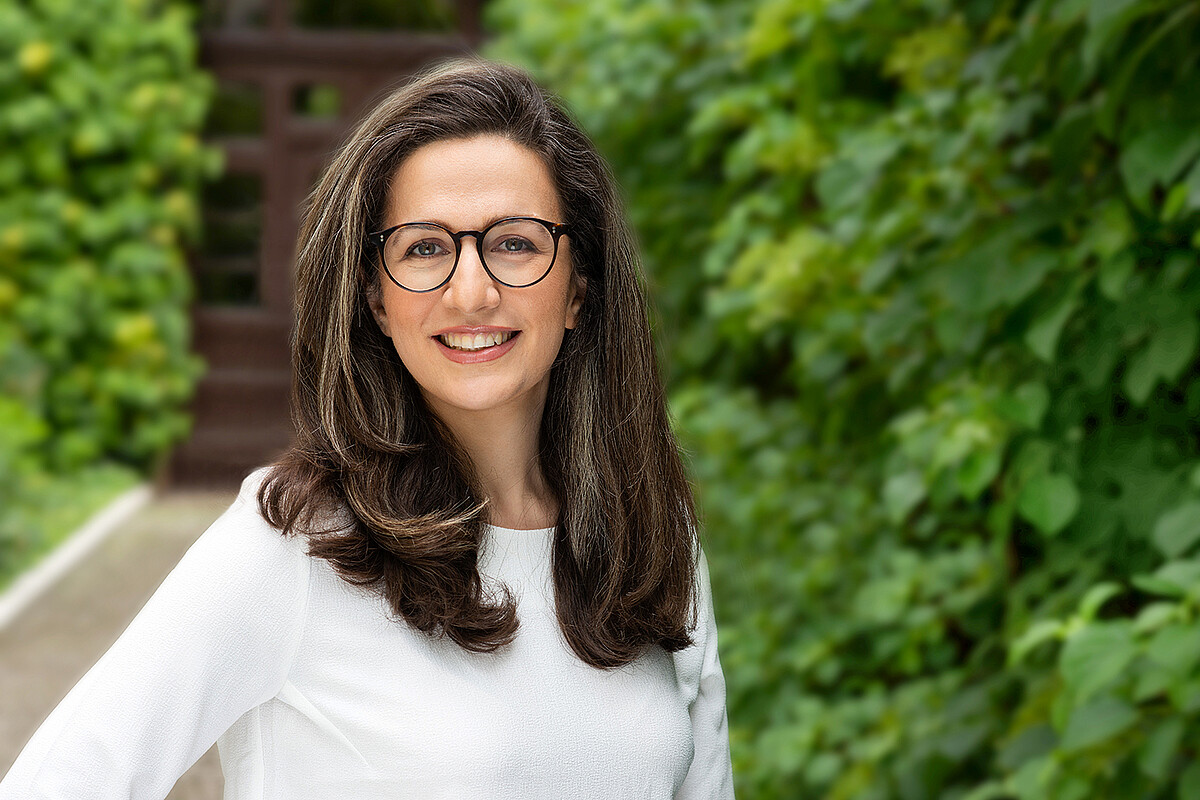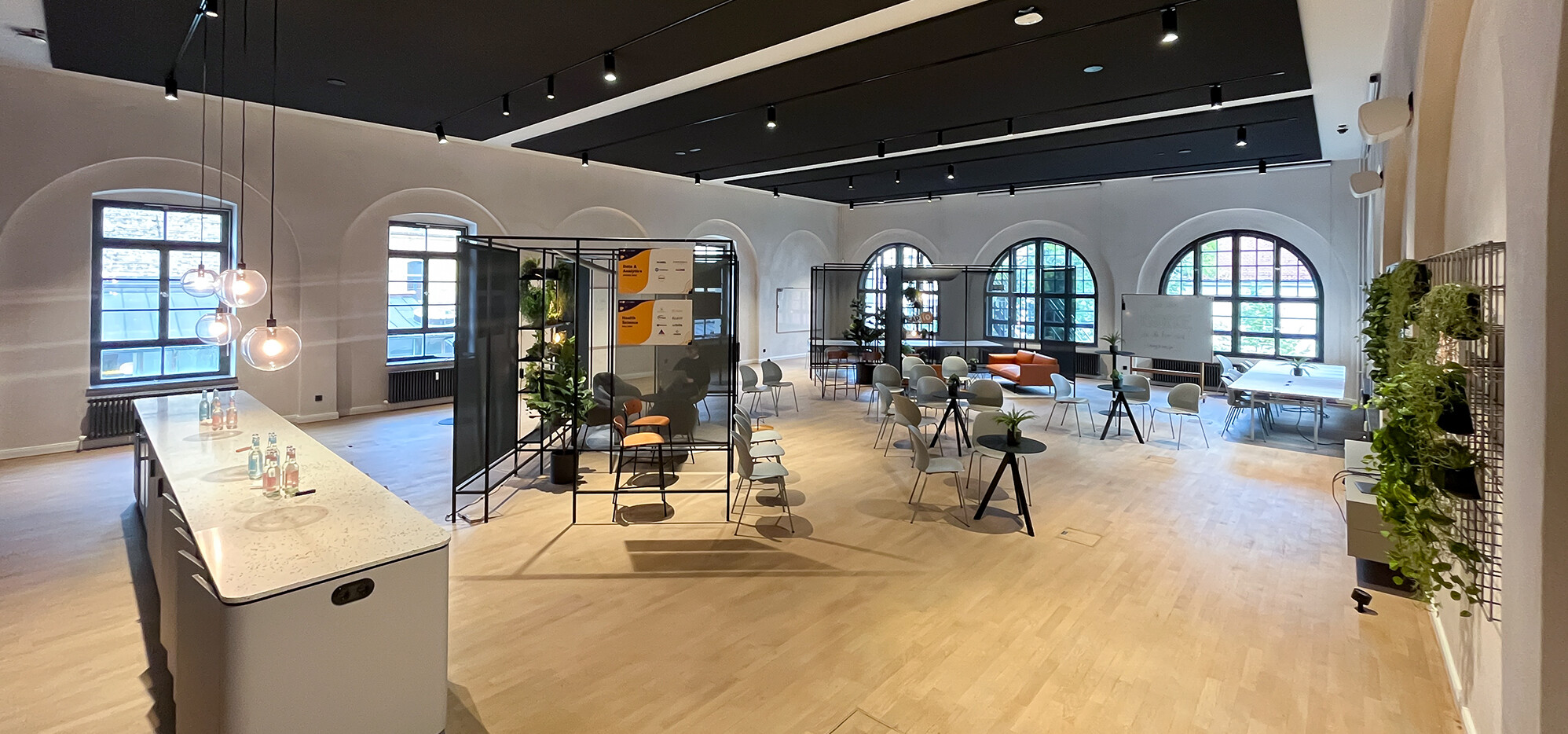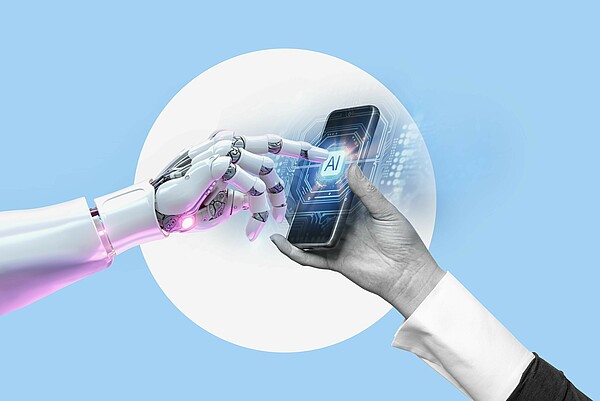The Complexity of Enterprise Solutions
SAP has a ‘Foundry’ in Berlin to help startups fit into their ecosystem. We spoke with Azadeh Ghahghaie.
Imagine you ran a restaurant. You’d need a process or tool that allows the waiters to allocate orders to tables. Perhaps ways need to be established to deal with other use cases: people ordering takeaway on the phone, for instance, or for orders that come in electronically from delivery services, which in a few minutes a guy with a scooter will be waiting to pick up.
All these orders are passed on to a different unit: the kitchen. Effectively there needs to be an interface where data is transferred from one unit to another. In a small restaurant this might take the form of a handwritten note, but there comes a point where analog solutions simply aren’t efficient enough.
The other unit, the kitchen, is working towards the same overall end – feeding the customers –, but it requires its own processes and tools. The cooks need to know how many potatoes or carrots there are in the pantry, and all the rest of the inventory. They may benefit from a tool that can work out how much of certain produce it is necessary to purchase at the market, based on recipes and expected volume.
Now, since you’re in charge of the restaurant, you’ll be interested in controlling and finances. You’ll want to know if your restaurant is running to capacity. You’ll need data, preferably visualized, to tell you how many tables are empty each night, and how much food is being thrown out at the end of the day. You’ll be interested in creating greater efficiency.
And then there’s the complexity of operative HR processes such as making sure the right staff is there every day, figuring out shift plans, holidays, sick leave. Not to mention making sure that everyone gets paid on time.
And the accounting department will have its own reality, trying to reconcile the money coming into your bank account with receipts, payment streams, and the contents of cash registers.
So even in a relatively simple operation like a restaurant there are many units, each with particular use cases and processes, and most of them involving some sort of data management.
Now imagine you want to scale all this. Let’s say you create a franchise, a chain of restaurants all over the country! Your enterprise will have all the processes we just described and tons more. You’ll need a technical, digital infrastructure in the form of software to manage your business activities such as accounting, procurement, project management, compliance, or supply chain operation.
Given this overall need, any large enterprise with many branches, products or services and thousands of staff, or any large operation like a hospital, university, or government service, has to figure out a simple dilemma.
- Give each unit the best tools available on the market for its individual use cases – this creates separate data silos and so the difficulty is creating the interfaces between them.
Or
- Choose one monolithic system for the entire enterprise where each unit has access to tools or functions it requires, and the underlying data is at least all in the same software. This latter approach needs complex implementation based on a thorough understanding of the processes and use cases of each unit, and needs to be flexible enough to easily accommodate new use cases that spring up in the individual units. And the monolithic systems almost always seem to entail that the system’s function for each specific use case will not be as good as external tools dedicated purely to this use case.
In order to prevent this dilemma, enterprise software houses today are creating what they call ‘ecosystems’. This means that customers can choose from a number of different tools for each use case in each unit, and all of these tools plug neatly into the underlying monolithic enterprise software. In this way, the bosses have their enterprise resource planning system which assures them that the operation is running to capacity (most of the tables are occupied every night and not too much food is being wasted) while the staff are using more or less best in class tools.
With such a degree of complexity and the myriad use cases that enterprise software needs to be able to deal with, it is small wonder that such systems are inherently too complex to work plug and play. To set one up, most customers of enterprise solutions need implementation partners. These are effectively technical agencies that know the enterprise software well enough to configure it (and all the interfaces with the partner tools) so that the system does what the customer wants it to do. This path is typically an expensive one, since not only does the enterprise software need to be bought, an agency needs to implement and then maintain it.
By creating tool ecosystems, the monolithic enterprise software houses harness the innovative power of startups creating new and potentially best in class solutions for specific use cases. The house is happy, the startups are happy because they gain access to customers through the enterprise software, and the customers are happy because they have a choice of the best tools that all work well together.
It is to this end that enterprise software house SAP established its “Foundries” network. In the third of our three part interview series on tech in Berlin (see The Tech That Makes Us See Ads and Tell Me Who You Are – ID Sovereignty), we spoke to Head of SAP.iO Foundry Berlin, Azadeh Ghahghaie.

Interview
Azadeh, SAP is a company that in Germany almost everyone has sort of heard of, but hardly anyone understands what their product really is. So two questions. Is SAP as well known a name in the rest of the world? And secondly, what does SAP actually sell and what do people do with this product?
Okay. The first question, is SAP as well known worldwide? Absolutely, yes. And why might you not know the people who are using it? Because we sell enterprise software. So if you are an individual not working in a big enterprise, you may never, ever see any affected system. But if you work at a big enterprise, the multinational corporations, the universities, if you are part of the government, if you work anywhere that your work includes signing into a system on a daily basis, definitely you will meet an SAP system and interact with it on a daily basis.
So what we sell? We sell enterprise software, our core product is ERP, enterprise resource planning. But that's where SAP started 50 years ago. By now if you look at the SAP portfolio, we have a wide range of products for 25 industries [such as aerospace, chemicals, defense, banking, energy, etc.] and six lines of businesses [such as ERP, HR, supply chain management, CRM].
So when it comes to HR, for instance, we are one of the leading market companies and vendors globally, not just in Germany but also in the US and worldwide. Sames applies to SAP Ariba when it comes to procurement and supply chain. So you may not have touched an SAP system, but when you eat an icecream next time, you should know that two thirds of all the world’s ice cream relies on our system. We may not make the ice cream for you but we bring the ice cream to you.
By August 2021, 77% of the world's transaction revenue touched an SAP software system. So when it comes to the impact that SAP has on a global enterprise scale, I would say hardly any company can compete.
Okay. That certainly answers that question. Now, why is it important to a company like SAP to support and promote or invest in startups?
First of all, we look at the software world not from the one vendor angle. It's an ecosystem business, I would say, because you can never do it alone. And it doesn't even make business sense if you want to basically bring the end to end innovation to our customers with various niche use cases. So everybody needs a partner ecosystem around it. And working with the startups provides a great opportunity for us to build a strong, innovative, young and dynamic partner ecosystem around our portfolio. So what we try to do in working with startups is we're trying to find really innovative niche technologies or use cases that we can match up with ours so that we can deliver that extra value to our customers and support them in their cloud transformation.
We try to serve our customers the best in class with our products in combination with our partner ecosystem. Now everybody knows the value that startups bring to the table, with their agility, cutting edge technology, and competitive nature. So for us as a big tanker, it's important that we embrace and include them. We love to work with speedboats.
And what is it that you look for in a startup team?
The team spirit.
You mentioned just now, the technology has to be there and the fields have to somehow fit into your portfolio, to your products as well. But what about qualifications beyond the technology and the team?
Okay, so first of all, it needs to be a B2B SaaS [business to business software as a service] startup. One that matches our portfolio and of course has a compatible technology stack and everything else.
What we look for specifically is that we can work with the startup where their target customer is our target customer. We look for where their value proposition lies. If they want to reach out to customers that we already have, or if we are targeting one segment and we can go in together hand in hand, work on a joint go to market, that's basically the matchmaking can happen.
If you’re a startup, it's not always that easy to get on the doorstep of big enterprises, big brands. But if we can come up with a nice joint go to market story, we can give such access to the startups working with us and basically make great contacts and context for the startup to work with our customers.
What’s the difference between external startups that you find and internal ventures from SAP? And how is the distribution at the Foundry?
We all go under the brand of SAP.iO which, by the way, stands for small input and big output. SAP.iO is divided into SAP.iO Intrapreneurship and SAP.iO Venture Studio, which is basically internal ventures, and SAP.iO Foundries. SAP.iO Intrapreneurship is meant to deliver new products and business units for SAP internally. SAP.iO Foundries delivers and strengthens partnerships.
So when I said that we want to work with the startup’s external innovation in the partnership scheme, it is not about acquisition. We don't want to necessarily buy them. No, it's all about your solution as a startup, on top of the SAP solution. The extension to the SAP solution can be the next level of innovation that we can bring to our customers.
When was the SAP.iO Foundry set up in Berlin?
2017. SAP.iO Foundry in San Francisco was the first Foundry and the second one was SAP.iO Foundry in Berlin.
“Which city has the highest potential for talent, agility, diversity and openness to embrace new ideas, new business models?”
And why Berlin? Why did the Foundry come here?
When we first started, our innovation strategy team was sitting in San Francisco, and given the Silicon Valley DNA, it was immediate, I mean, it made total sense to start a Foundry in San Francisco because that is the hot spot of all the innovation happening in the US.
And then, of course, the mothership of SAP is in Germany. And we looked and saw that Berlin was the choice that would make most sense. Across Germany, which city has the highest potential for talent, agility, diversity and openness to embrace new ideas, new business models? It's Berlin. That's why it was the natural next spot for a Foundry.
What has changed since 2017? Since then, what has changed in the city or for the Foundry?
Since 2017 I wouldn't necessarily say that anything essentially has changed about SAP.iO Foundry. We matured and our business model matured with us. But the city itself has gone through so much change. I mean, the city has grown in terms of size, the population, the number of the tech companies that moved to Berlin, brought their second offices or their headquarters to Berlin, either internationally or the ones from Germany. I think the number has been growing drastically.
It is a great opportunity to be sitting in the heart of this, so that we can scout the market and find the best in breed from different industries and technology areas to bring to our partner ecosystem.
Which programs does the Foundry offer for startups and what benefits do they get from taking part?
Do you mean topic wise?
Yeah. And how do you organize the program?
So, as I said earlier, SAP delivers to about 25 industries with six lines of business. So across our Foundries we are open to pick up startups from any of the industries when we plan to strengthen our partner ecosystem there. So in the Foundry Berlin since 2017 we have run programs on data and analytics, industry 4.0, health and life science, sustainability, future of work, and finance and risk management. So just name it, whatever industry segment possible. We are open to topics as long as we see it's a strategic fit for SAP.
And if you want to ask about the program format and what it offers, it's not the typical accelerator program. Of course, we offer the general offerings of an accelerator like mentorship, sessions and workshops on sales and marketing, strategies on pricing, and fundraising. So that's included.
But the main work during this program is to identify an integration scenario, and in this case integration between the startup solutions and an SAP product. So we are able to come up with a joint story to tell together. So the best case scenario and the win would be if after or during the course of the program, the startup is able to sell SAP to our customers and we, SAP and the innovation, can go together and find joint markets in the future, or they can basically deliver the innovation to our customers directly.
So it's a combination of classic accelerator offerings and partnership program. And the value for the startup is that we help them scale, we help them scale with SAP. First of all, we provide them with technical mentorship on SAP integration. We support them with their sense of strategy. Basically anything they need. And they have wide access to SAP executives who have essentially spent their lives talking to customers and they know the market inside and out. And also the customer access for the startup is a big win. So if they do it right, they can really grow and scale with SAP.
And how much does it cost them?
Zero. It's a zero equity ask program. Our mission is to strengthen our partner ecosystem. And also we are doing this for our customers and our partner network. So we don't charge the startups anything.
Wow. Can you tell us something about some of the startups, some of the companies in your portfolio? Which are the most notable and which is your personal favorite?
Oh, don't ask me that. It's like asking a mom which kid is her favorite. I cannot say that. I mean, I was privileged to work with some of the brightest and the most impactful startups globally in the past three years. Some of them in the sustainability area are really favorites. I mean, some of the Berlin based ones. But no, Olaf, I cannot do this!
But for reference, we have really some nice specific stories that I'm happy to share so that it can be a reference for you.
Oh, yes, please, go on then. Name me some names.
Absolutely. And these success stories are usually created out of the joint work that we have done with our customers. So if we can connect our startups with our customers and both sides are happy, then we are happy. So at SAP.iO, we always call it a win win win scenario.
Thank you, Azadeh, for your insights into the SAP.iO Foundry in Berlin.
These are some of the Berlin-based startups that the SAP.iO Foundry team has helped to grow:
| Startup | Program |
|---|---|
| Shyftplan | Future of Work Program |
| Workmotion | Future of Work Program |
| Blacksquared GmbH / Changers.com | Sustainable Future Program |
| Footprint Technologies | Sustainable Future Program |
| Agranimo | Industry 4.0 Program |
| LiveEO | Industry 4.0 Program |
| Hardskills | Diverse-Led Startup Program |
| Moberries | Diverse-Led Startup Program |
| ZkSystems | Diverse-Led Startup Program |
| Datarade | Enterprise Software Program – Powered by Techstars |
| Weview (Acq. by DemoUp Cliplister) | Enterprise Software Program – Powered by Techstars |
| Ultimate.ai | Machine Learning-enabled SaaS applications |
Interview: Olaf Bryan Wielk, ideenmanufaktur
Header image: © SAP.iO





